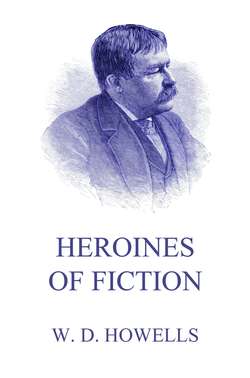Читать книгу Heroines Of Fiction - William Dean Howells - Страница 38
На сайте Литреса книга снята с продажи.
III
ОглавлениеScott's failures were among his gentilities, his lords and ladies, his princes and princesses, who are always more or less like the poorer sort of stage players. I do not know that he fails more signally with his women than with his men in high life; but Lucy Ashton is the only woman of gentle birth in his romances whom I remember, from my first long-ago reading, for her distinguished qualities, if indeed she has more than one of these. All his women of lower station, however, especially those that come casually and momentarily into the story, are alive, and speak a tongue as different from the literary language of their betters as nature is from artifice. He was essentially a humorist and humanist; he dearly loved and enjoyed such of his fellow-beings as he could come close to through their originality, or eccentricity, or simplicity; and there is no laird's leddy, no bare-legged lassie, no screaming or scolding old-wife, who is not as veritable as any man of her rank, and far more so than any man of higher rank. Such figures abound in his Scotch stories and give them that air of reality which is never quite absent from them. But again when he transcends the sort of character which he knows personally or by familiar hearsay, he fails as dismally in diving low as in soaring high. With such a figure as Meg Merrilies, for instance, he does nothing that convinces you of her verity; she remains as strictly of melodrama as any mouthing champion in "Ivanhoe"; Rowena herself is not more really unreal, not more improbably moved; and she is far less noisy and tiresome; for the maledictions of Meg Merrilies actually bore one; and Meg is mostly maledictions.
In the story which resounds with them, there is one young lady who divides the honors of heroine with the gypsy; and in her, for once, Scott is able to impart the charm of a lively girlishness. Julia Mannering is sinuously true, after the manner of her sex, and light of tongue and heart rather than head. She is a genuine personality; and she carries off an impossible part in the plot with so much vivacity and naturalness that one is almost as much in love with her as with any of the ignorant and amusing housewives and farm-bodies.
"Waverley " offers no such figure as this young lady in "Guy Mannering," to my liking. Rose Bradwardine is a nice girl, and fit to be married by a hero who repents being fool enough to have fought for the Pretender. But the farthest stretch of charity cannot find her a character. She does what a young lady ought because she is bidden; her speech is the effect of that ventriloquism which Scott too obviously practiced in speaking his own words from whatever lips were convenient. She is not the worst instrument of this sort; and Flora Mac Ivor is not the most diaphanous of the author's failures to construct a credible image of historic motive and personality. It is not that the sister of a Highland chieftain, supporting the rebellion of Charles Edward Stuart, might not play the part assigned to Flora Mac Ivor; but that she does not play it in a way to make us feel that she is deeply interested in it. We are told much about her, but we are shown very little; and are made witnesses of but one moment of poignant feeling in a woman who must have had many, if she were really a woman. This climax is fitly reached in that last interview of Waverley's with Flora when he finds her sewing upon the shroud of her brother who is about to be executed for treason. Then she blames herself for her brother's doom as something that her own impassioned loyalty to the Stuarts had urged him forward to. She realizes that the cause was always hopeless, and while she still believes it just and sacred, she agonizes at her part in it for her brother's sake. This point is really fine—the finest in a story whose course is loose and straggling, and whose effects have rarely the compactness that deep passion alone can give.
